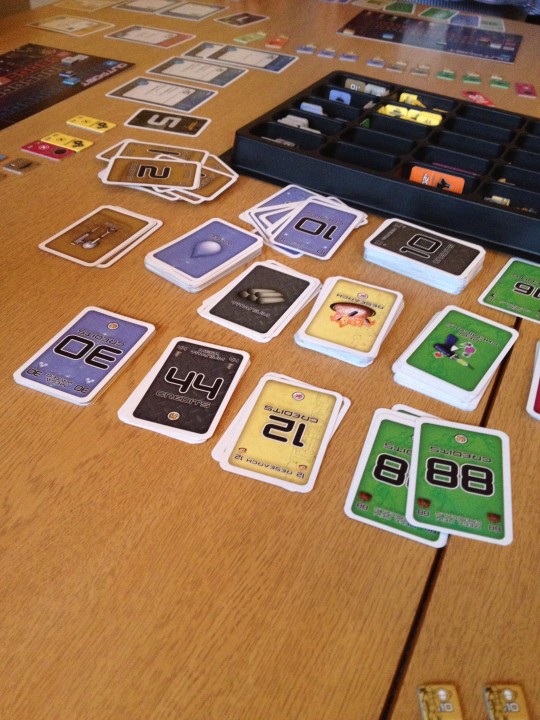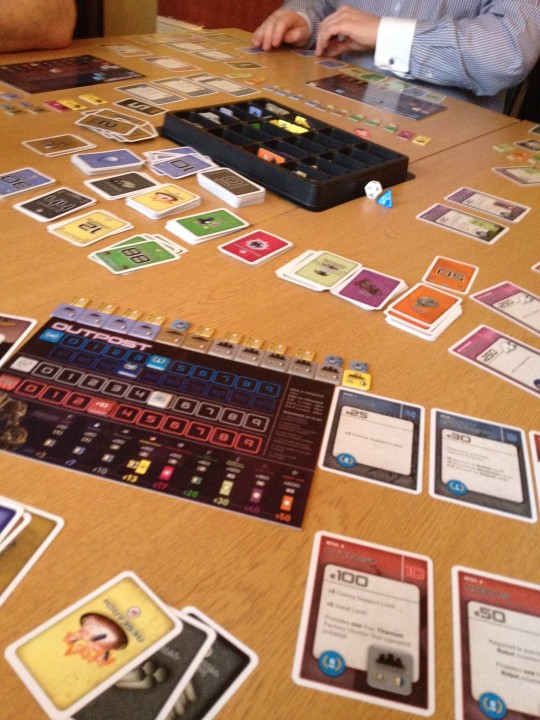Outpost is Maths… In… Spaaaaace…
A game designed by Adam Up.
Players compete to build the best outpost. They must build and staff factories to produce resources which are then used to build more factories and purchase any of 13 outpost improvements which give different advantages.
I’ve been playing a lot of Splendor lately. A game where you collect gems to buy things which give you a discount on further things. In fact, I had just finished playing Splendor when I sat down at Outpost.
Outpost is a game where you gain income from buildings that you use to buy buildings. These give you more income etc It’s similar in a way but both are very different.
For starters, Splendor has heavy components and Outpost is component heavy. Cards, cards and more cards and tokens, counters and chits everywhere!

Overview
This is a game of finding the best way to manage your buildings, money and workers. You see you can buy as many buildings as you like. If you can afford them, but they only give you money if you have someone in them.
So you buy a person for each building you have. But there is a population limit so you have to increase that at some point or it holds you back quite a bit.
Each manned building gives you cards for that resource type and each card is worth a different number of credits. The more cards, the more credits, but you have a hand limit that will need to increase too.
Living Capacity and the Hand Limit can be increased by winning auctions on certain cards that arrive at the start of each round. They start off cheap and basic and each ‘Era’ get more expensive and more useful. These cards also have other abilities including giving you access to bigger and better buildings.

Internalise
The good thing about these auctions is that if you know you’re not going to buy anything or you’ve spent everything you want to you can ‘Internalise’. All this means is you can get on with building buildings and workers. I LOVE this, it makes everything go so quick and this ‘main phase’ which usually takes a long time in most games just flies by. You can even pop out for a drink or a bathroom break at this point and keep the game flow going.
It’s a good job this bit is quick because there is something that slows the game down. Mathematics.
Maths and Maths
When spending Credits in auctions, you’re constantly having to add and re-add as bids are made and countered. You don’t get change from your bid so it’s not just a case of adding to increase it, you have to rework your entire bid on some occasions.
Also, when buying buildings and workers you can’t mix card types. So if you have 20 Credits to buy that Water Plant you wanted but 13 are in Water and 7 in Ore you’re out of luck. It’s at this point you’re adding up and swapping cards around in order to spend what you need while using as few cards as possible and wasting as little money as possible. Remember, you don’t get change.
Luckily, this can all be done while your opponents are playing an auction as seriously as a World Series of Poker game so you usually have the time.
Outpost Summary
The only other issue I have is that there is no real catchup mechanism and as it’s a race to a certain number of points there is very little you can do.
Despite that and the heavy maths element, I do like this one. I would play it again, or maybe even it’s reimplementation ‘The Scepter of Zavandor’ should that be available.
Jesta ThaRogue



Leave a Reply